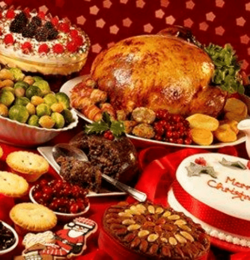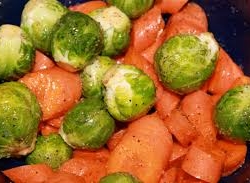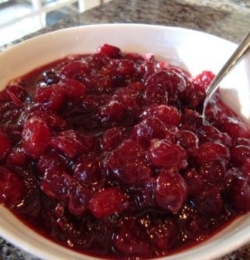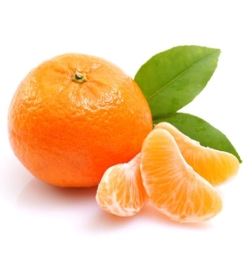Article by the Drummond Team
Its that time of year again! Food seems to be all round us, and exercise falls by the way side as our calendars fill up with festive parties, activities, and eating…lots of eating!
Here’s some great information on nutritional facts for some of our favourite Christmas foods – and some tips to help combat that festive calorie overload.
The Nutritional Benefits of Christmas Food:
Christmas, with its chocolate, pies, pudding and alcohol is often thought of as an unhealthy, indulgent time of year. In fact, many of the foods traditionally eaten at Christmas can be very nutritious.
Turkey
Turkey is a good source of protein and without the skin it is low in fat. Turkey is also a source of B vitamins (vitamins B1, B6 and B12) which are needed to get energy from food.
Brussels sprouts & carrots
 Brussels sprouts are a good source of vitamin C and folate. Carrots are a good source of beta carotene which our bodies make into vitamin A, important for normal vision and a healthy immune system. Both Brussels sprouts and carrots also provide fibre needed to keep the gut healthy. Having a portion (80g) of both of these vegetables with your Christmas lunch will count as 2 of your 5 a day.
Brussels sprouts are a good source of vitamin C and folate. Carrots are a good source of beta carotene which our bodies make into vitamin A, important for normal vision and a healthy immune system. Both Brussels sprouts and carrots also provide fibre needed to keep the gut healthy. Having a portion (80g) of both of these vegetables with your Christmas lunch will count as 2 of your 5 a day.
When cooking vegetables, remember:
Don’t add salt, add herbs for extra flavour – instead try steaming vegetables rather than boiling as steaming retains more vitamins in the vegetables. If you do boil vegetables use the cooking water to make the gravy as this contains any vitamins that have been lost into the water.
Roast potatoes
In the UK, potatoes make a good contribution to our fibre, potassium and vitamin C intakes and are fat free before you roast them! Leave the skins on to keep more of the fibre and vitamins in the potato. Choose vegetable oils, instead of a solid fat like lard, for roasting as they are lower in saturated fats and high in polyunsaturated fats. This is important because a high intake of saturated fats can increase blood cholesterol levels, especially LDL cholesterol often known as ‘bad’ cholesterol which is bad for heart health, while polyunsaturated fats appear to be beneficial for heart health in moderate amounts.
Cranberries
 Fresh or Frozen cranberries are packed with vitamin C. But because they are tart cranberry products often have added sugar. So why not make your own cranberry sauce so you can control how much sugar you add or combine freshly squeezed juices with no added sugar cranberry juice for a Christmas drink.
Fresh or Frozen cranberries are packed with vitamin C. But because they are tart cranberry products often have added sugar. So why not make your own cranberry sauce so you can control how much sugar you add or combine freshly squeezed juices with no added sugar cranberry juice for a Christmas drink.
Nut roast
Nut roasts are quite high in fat but the fat is mostly in the form of monounsaturated fats which may have be good for our heart health especially when they replace saturated fats in the diet. Nut roasts are also a good source of potassium, iron, zinc, B vitamins and folate, and vitamin E.
Dates and figs
Figs and dates are available fresh, but we typically associate dried fruits with Christmas. They are after all key ingredients in the Christmas pud and Christmas cake! Dried figs and dates are low fat and good sources of fibre and are great chopped and added to cereal or porridge. Dried figs provide potassium, calcium, iron and magnesium. And don’t forget dried fruit can count towards your 5 A DAY – 3 dried dates or 2 dried figs count as 1 portion.
Clementines, satsumas and tangerines
Clementines, satsumas and tangerines are a great source of vitamin C. Vitamin C is important for our immune system so having enough in our diet is important to help keep us well for the big day. But contrary to popular belief taking vitamin C supplements has not been shown to prevent the common cold.
Nuts
Brazil nuts provide potassium, calcium, magnesium, iron, zinc and vitamin E. Brazil nuts are also one of the richest sources of selenium. Other nuts like walnuts and almonds can also contribute important nutrients like potassium magnesium, iron and zinc . Nuts can be eaten as a snack or can be added to salads, muesli or used in baking. However they are high in fat (even though it’s ‘good’ fat) so only eat in moderation.
Christmas Food Survival:
Here are ten tips to help you survive the lead into and the aftermath of Christmas!
Keep making normal healthy low fat meal choices right up to the holidays
Eating Out & Party Foods:
If having special Christmas lunches/dinners out, stick to two courses not three (preferably low fat starter and main course, rather than desert), ask for your vegetables without butter.
- Don’t eat additional bread rolls, etc with meals.
- Make one of your evening meal each day high protein, with lots of vegetables and carbohydrate. (i.e. lots of meat or fish with lots of vegetables and seeds)
- Keep low fat snacks available, i.e. vegetable dips to avoid the Quality Street.
- Keep alcohol to a minimum.
- Drink low alcohol beverages where possible, or alcoholic drinks such as dry white wine (100ml of dry wine = approx 70 calories), low calorie soft drinks, and lots of water.
On Christmas Day:
- For your Christmas dinner, dry roast (without added fat) all including potatoes.
- Cook the turkey with water in the roasting tin and not additional fat (this will keep it moist thus removing the need for the additional fat)
Source: British Nutrition Foundation
